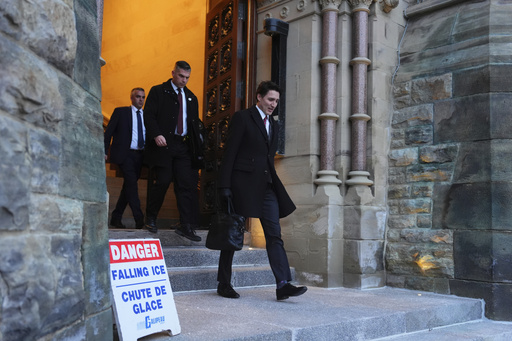TORONTO — The prospects for Canadian Prime Minister Justin Trudeau to continue in his role have taken a downturn as the opposition party, which has supported his government for several years, declared its intent to vote no confidence once Parliament reconvenes.
Facing increased pressure, Trudeau made changes to his Cabinet on Friday, yet the question of whether he will resign soon remains uncertain. After a meeting with his new Cabinet, Trudeau refrained from discussing his future or fielding questions from the press. Instead, he focused on the potential economic implications of Donald Trump’s presidency, specifically the threat of a 25% tariff on Canadian goods.
“In precisely a month, a new president will take office, and we are readying Canada for that scenario,” Trudeau stated in his first comments to media following the resignation of his finance minister. “Our priority is to address whatever actions the U.S. administration may pursue, as this will require substantial effort on our part.”
However, Trudeau faces growing dissatisfaction regarding his leadership capabilities. The unexpected withdrawal of his finance minister earlier in the week may represent a setback from which he could struggle to recover. David McGuinty, the newly appointed Public Safety Minister, relayed that Trudeau has asked for time to consider his own future. Rachel Bendayan, responsible for official languages, added that the Prime Minister has indicated he is confronted with a challenging decision.
This political turmoil arises during a particularly critical period for Canada. Trump continues to undermine Trudeau, labeling him as the leader of the “51st state,” and has threatened significant tariffs unless Canada can resolve what he has termed a migrant and drug crisis at the U.S. border. This claim is contentious, given that the volume of both migrants and drugs crossing from Canada is notably smaller than that from Mexico—a point Trump has also made threats against.
Marc Miller, the immigration minister and a close ally of Trudeau, emphasized the urgent economic risks: “In the next two months, there exists an existential threat to Canada’s economy, which could lead to substantial job losses. The unemployment rate could potentially double. Our focus must be on confronting that reality,” he stated. He maintains confidence that Trudeau is the right leader for this challenging situation.
Currently, Parliament is on break until late January; however, the left-leaning New Democratic Party (NDP) announced on Friday its plan to initiate a vote of no confidence against Trudeau when lawmakers return on January 27. Since the Liberals do not possess a majority in Parliament, they have historically relied on the NDP for legislative support, which has now diminished—NDP leader Jagmeet Singh has urged for Trudeau’s resignation and confirmed the intention to vote against the government.
“No matter who leads the Liberal Party, this government’s time has expired. We will introduce a clear motion of non-confidence during the next session of the House of Commons,” Singh stated in a letter before the Cabinet reshuffle.
Trudeau could potentially postpone Parliament’s return or choose not to run in the upcoming election, paving the way for a leadership contest within the party. Recently, Liberal MP Rob Oliphant added his voice to those calling for Trudeau’s resignation, advocating for a transparent and vigorous leadership selection process.
Leading Canada for nearly ten years, Trudeau has faced declining popularity across numerous fronts, including soaring living costs and inflation. Lacking immediate methods to remove him from leadership, he has the option to announce his departure once a new party leader is elected, or risk a “no confidence” vote that could trigger an election likely to favor the Conservative Party.
Pierre Poilievre, leader of the opposition Conservatives, is asserting that Canada needs swift elections and a Prime Minister capable of tackling Trump effectively: “We cannot have a chaotic administration leading our country into trouble,” he remarked.
Concerns over Trudeau’s leadership intensified following the resignation of his finance minister and deputy prime minister, Chrystia Freeland, who had voiced criticism regarding Trudeau’s economic strategies amidst the looming tariffs. Additionally, the housing minister also resigned just prior to Freeland’s announcement.
Daniel Béland, a political science expert from McGill University, suggested that Friday’s reshuffle was a necessary response to recent departures but commented that, for many Canadians, it might just seem like “rearranging the deck chairs on the Titanic.”


